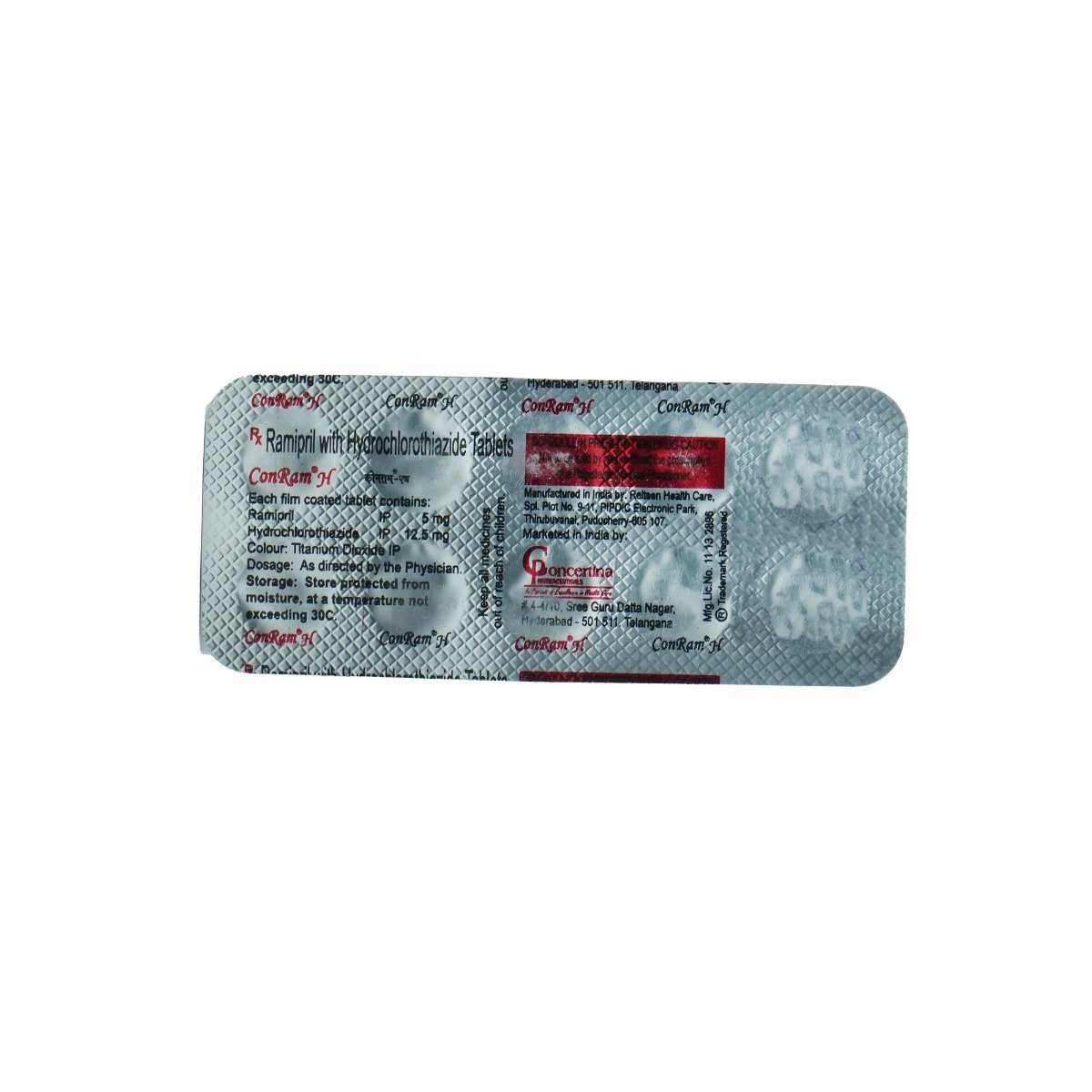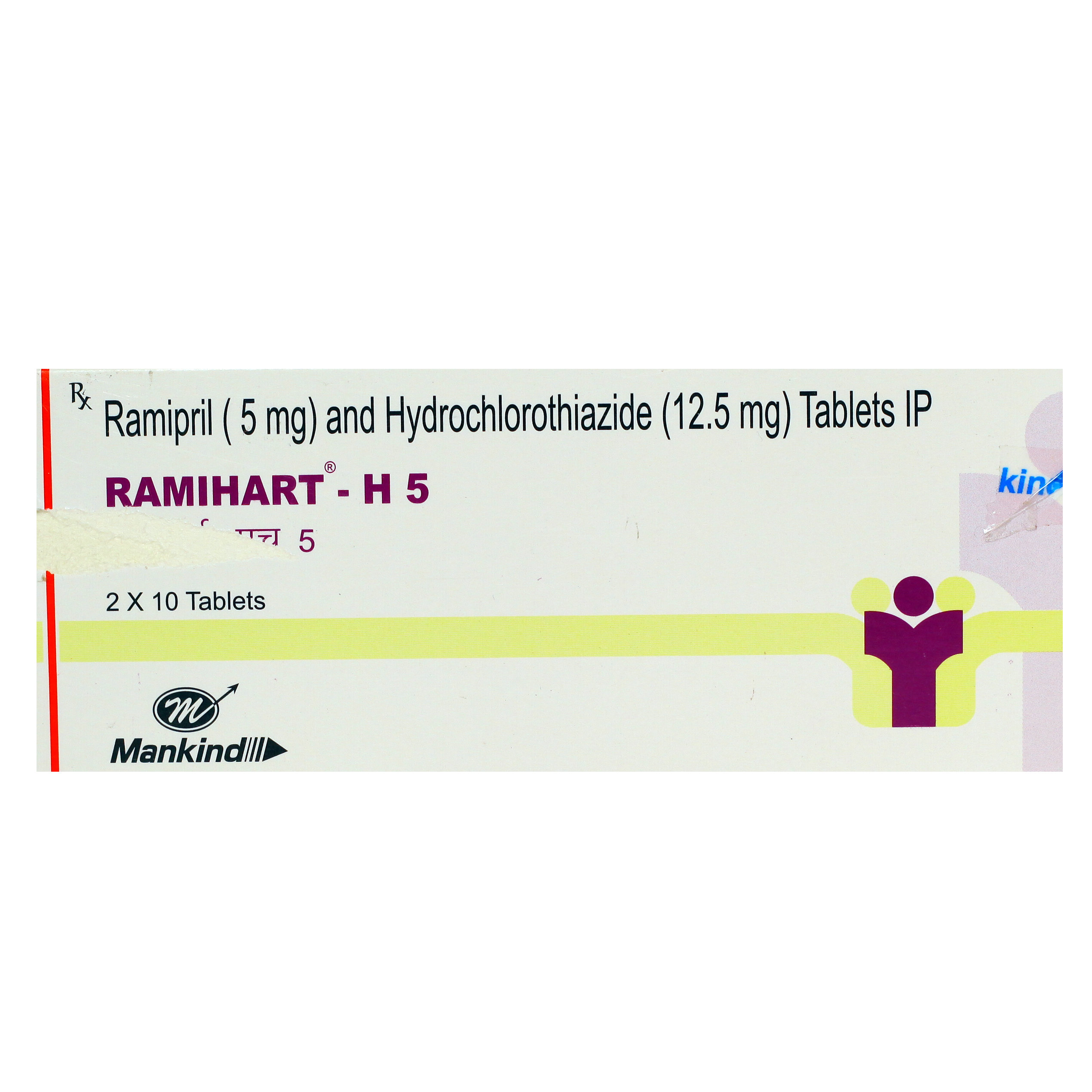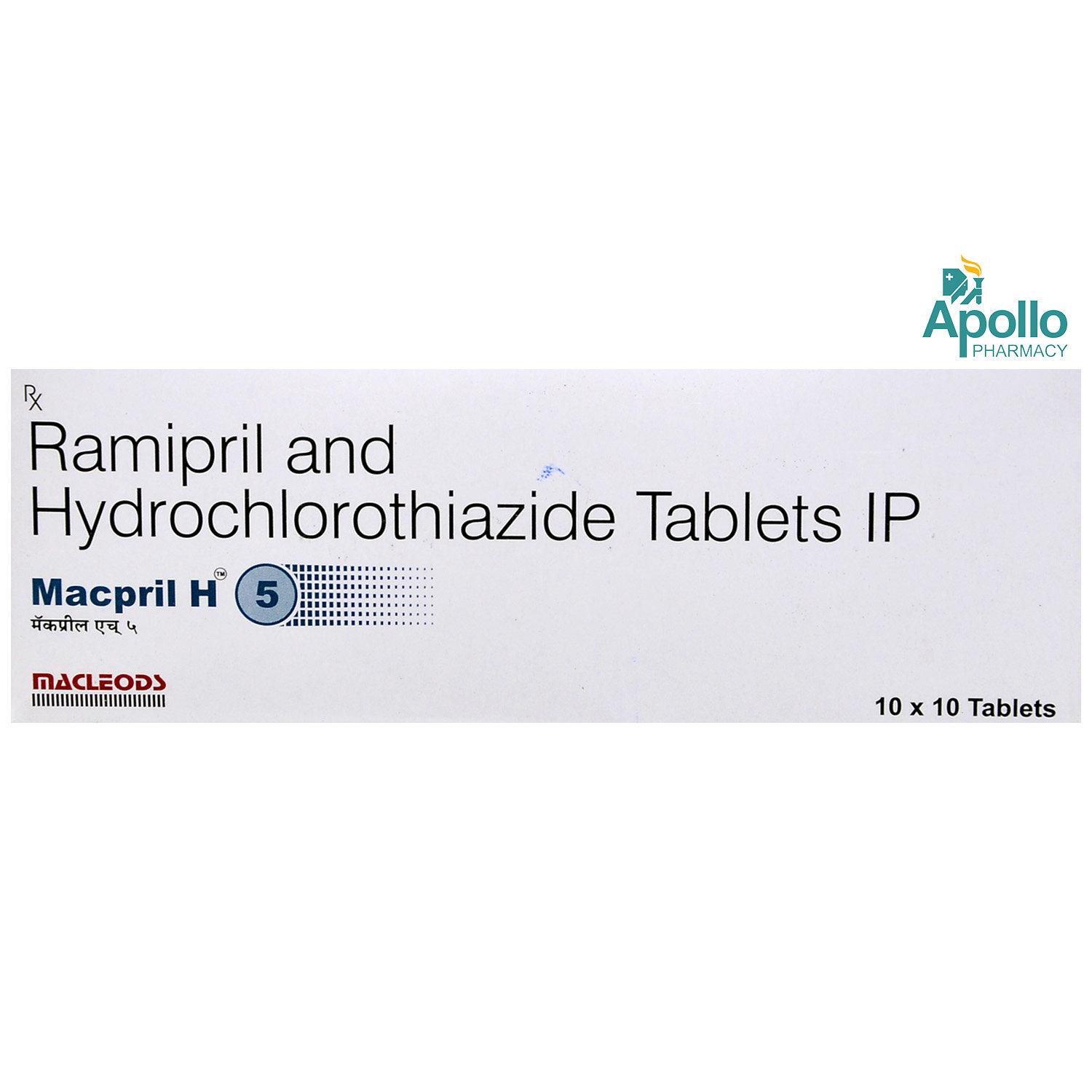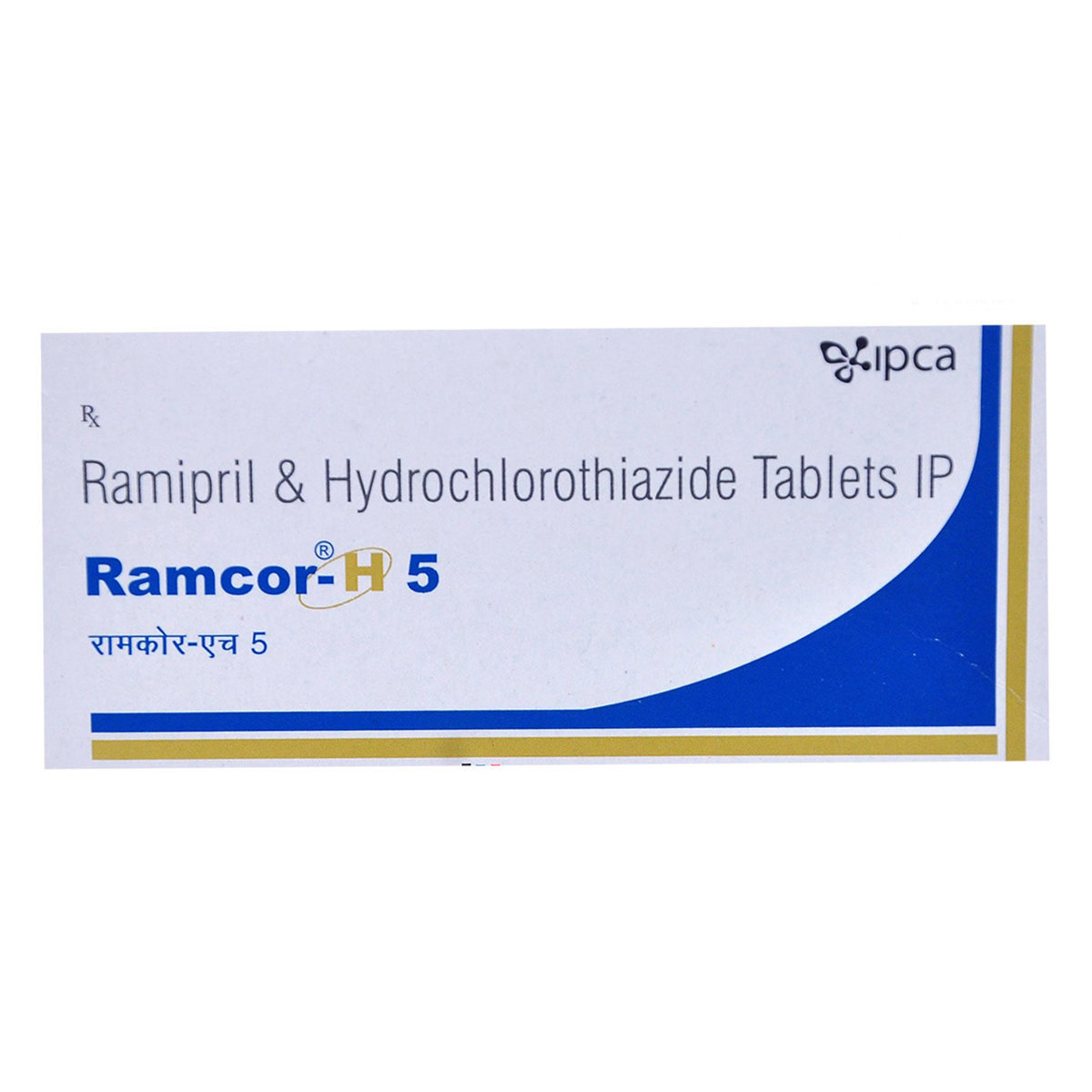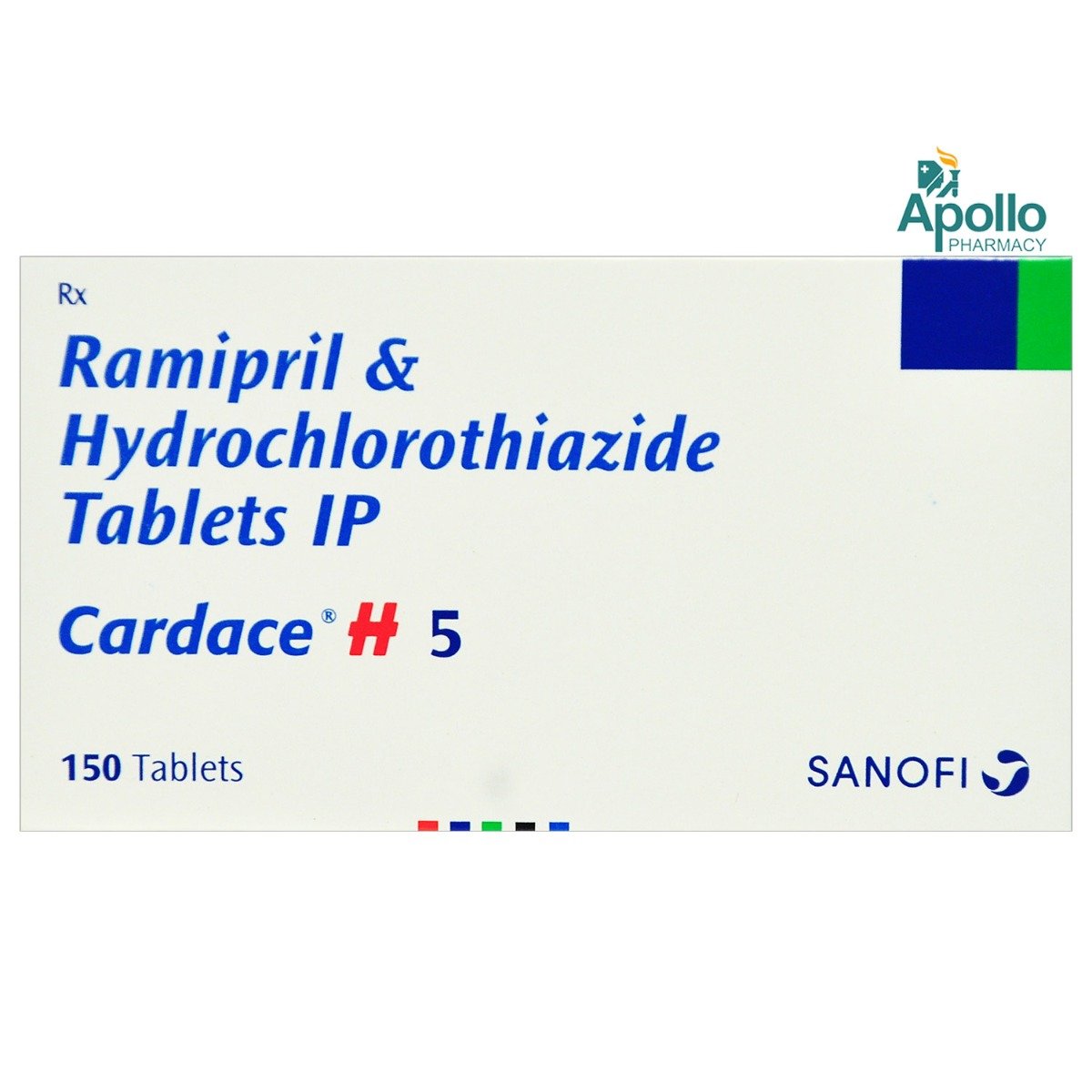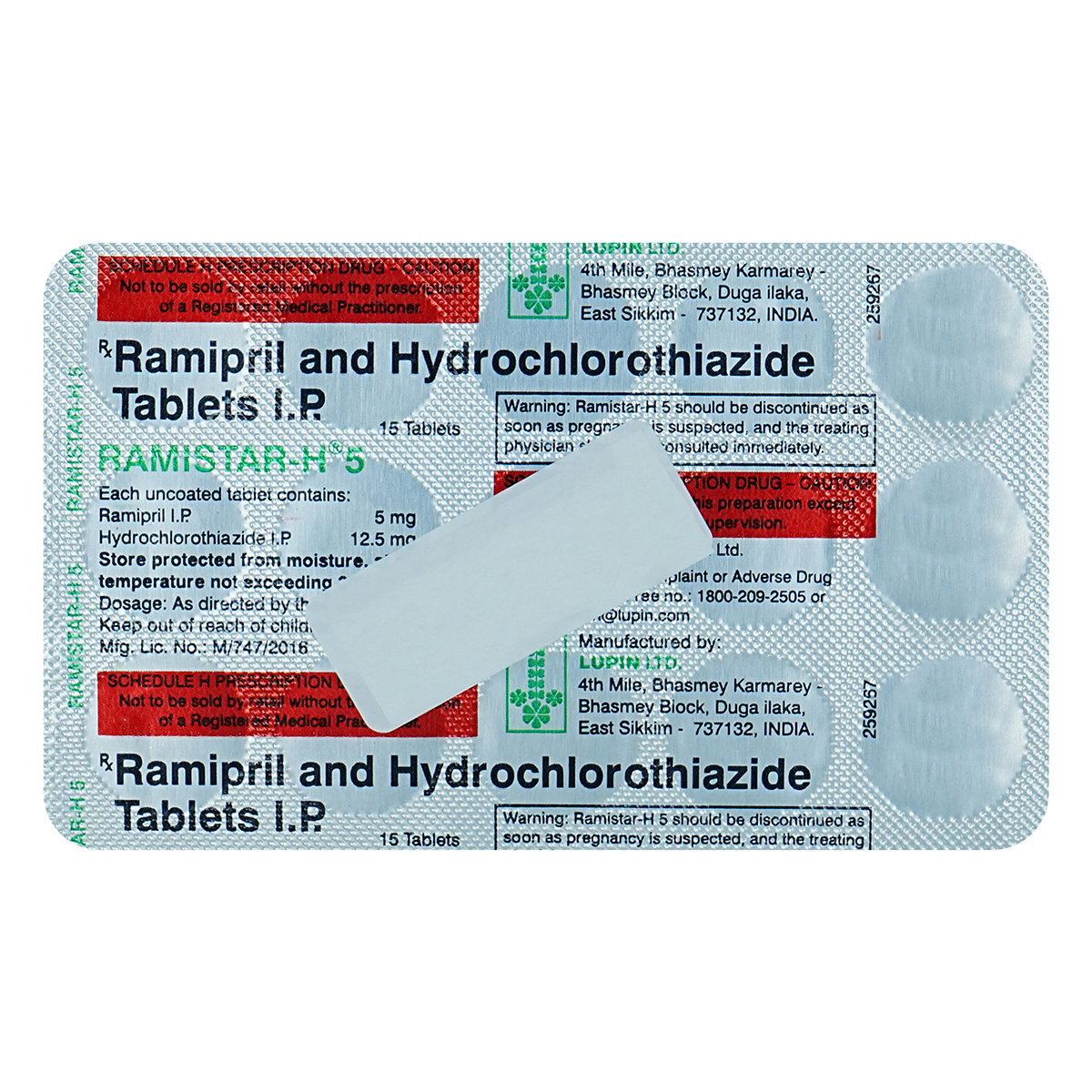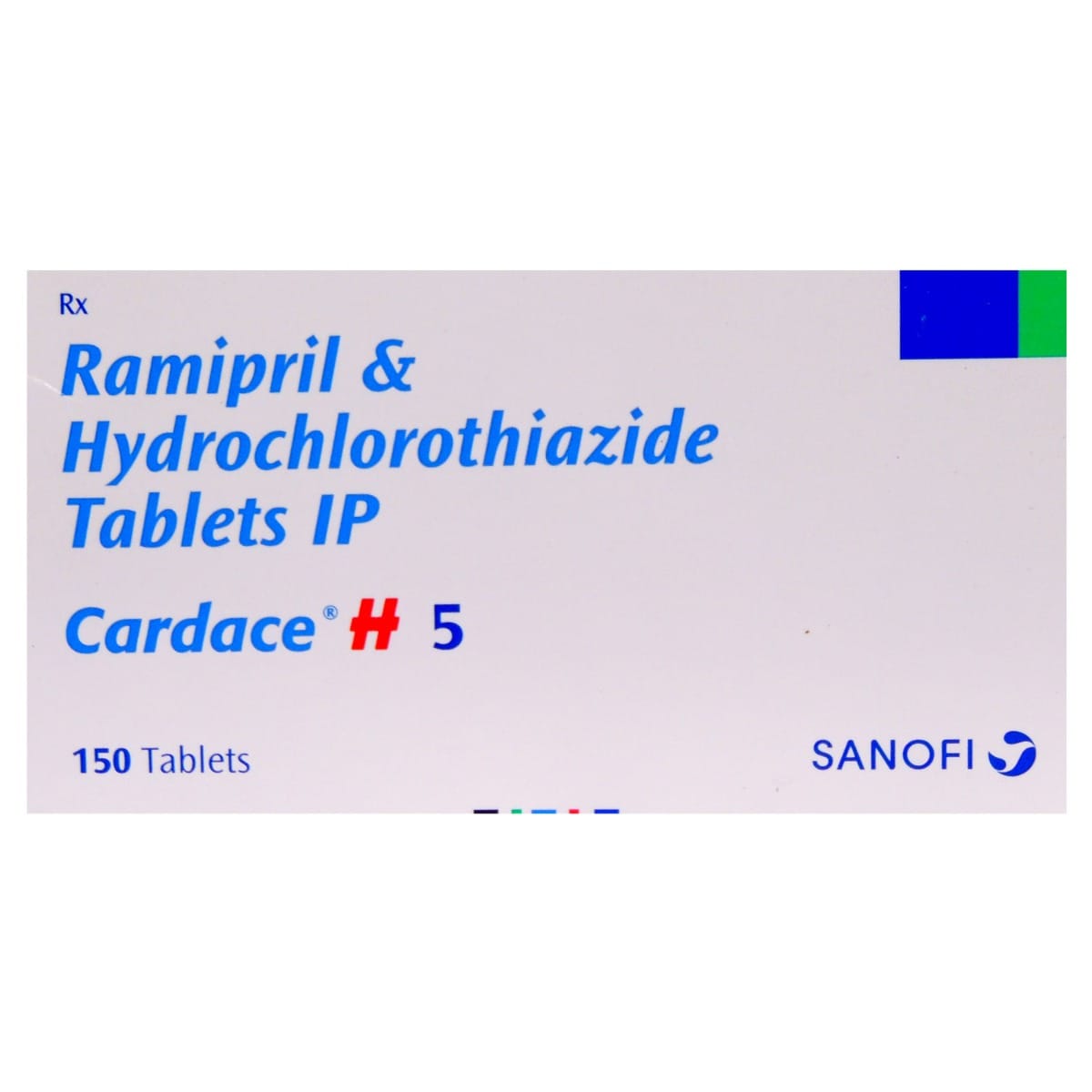RAMIPRES H 5MG TABLET

MRP ₹133.5
(Inclusive of all Taxes)
₹20.0 Cashback (15%)
know your delivery time
Provide Delivery Location
Composition :
Manufacturer/Marketer :
Consume Type :
Expires on or after :
Return Policy :

Secure Payment

Trusted by 8 Crore Indians

Genuine Products
Therapeutic Class
Country of origin
Manufacturer/Marketer address
Disclaimer
Alcohol
Safe if prescribed
RAMIPRES H 5MG TABLET may enhance the hypotensive (low blood pressure) effect if alcohol is taken along with. For better advice, you should consult your doctor about whether you can take RAMIPRES H 5MG TABLET with alcohol.
Pregnancy
Consult your doctor
The use of RAMIPRES H 5MG TABLET or any ACE inhibitors (Ramipril) is usually contraindicated during the second and third trimester of pregnancy. It may cause harm to the developing fetus. Hence, you should always consult your doctor before using RAMIPRES H 5MG TABLET.
Breast Feeding
Consult your doctor
Use of RAMIPRES H 5MG TABLET is not recommended during the breastfeeding stage.
Driving
Safe if prescribed
Drive with caution, RAMIPRES H 5MG TABLET may cause blurry vision, and dizziness or weariness may occur.
Liver
Consult your doctor
Rare elevation in the liver enzymes (like bilirubin) has been observed while taking RAMIPRES H 5MG TABLET, so it must be taken with caution. If you have a history of liver diseases/conditions, the dose may have to be adjusted by your doctor.
Kidney
Consult your doctor
RAMIPRES H 5MG TABLET to be taken with caution, especially in case of severe kidney disease. The dose may have to be adjusted by your doctor. RAMIPRES H 5MG TABLET should be given with precaution in hemodialysis condition.
Children
Safe if prescribed
RAMIPRES H 5MG TABLET is not recommended for children. The safety and effectiveness of RAMIPRES H 5MG TABLET have not been established in children due to limited testing of this drug on children by competent authorities worldwide. If necessary, your doctor will decide whether to give RAMIPRES H 5MG TABLET or not.
Product Substitutes
About RAMIPRES H 5MG TABLET
RAMIPRES H 5MG TABLET belongs to a class of medication called 'anti-hypertensive agents' prescribed alone or in combination with other drugs to lower the raised blood pressure. Hypertension (High blood pressure) is a condition in which the force exerted by the blood against the artery walls becomes so high that it causes health problems, such as heart disease.
RAMIPRES H 5MG TABLET contains two medicines: Ramipril (blood pressure-lowering agent) and Hydrochlorothiazide (diuretics or water pills). Ramipril is an angiotensin-converting enzyme or ACE inhibitor that lower increased blood pressure by blocking a naturally occurring substance known as angiotensin II (that tightens your blood vessels). It allows these constricted blood vessels to relax and therefore helps lower high blood pressure. On the other hand, Hydrochlorothiazide (diuretic) works by increasing the amount of urine passed out from the kidneys. It effectively reduces excess fluid overload in the body and treats oedema (swelling) associated with heart, liver, kidney, or lung disease. This reduces the heart's workload and makes the heart more efficient at pumping blood throughout the body. Thus, both help lower high blood pressure, reducing heart attack or stroke chances.
You can take RAMIPRES H 5MG TABLET with a meal or after/before a meal. Your doctor will advise you on the exact dosage and how often you have to take RAMIPRES H 5MG TABLET based on your medical condition. Sometimes, you may experience headaches, tiredness, slow heart rate, and nausea. Most of these side effects of RAMIPRES H 5MG TABLET do not require medical attention and gradually resolve over time. However, if the side effects are persistent, reach out to your doctor. RAMIPRES H 5MG TABLET may lower your blood pressure, especially if taken with alcohol. So, avoid driving and operating heavy machinery.
Try not to stop taking this medicine of your own. You should not stop using the RAMIPRES H 5MG TABLET even if your blood pressure becomes normal. Doing so may worsen your condition. Tell your doctor if you have had or currently have liver, kidney, or heart problems. RAMIPRES H 5MG TABLET is not recommended in pregnancy and lactation. You should regularly monitor your blood pressure and heart rate. Please tell your doctor if you are taking any other medicines or are allergic to RAMIPRES H 5MG TABLET. Reducing the amount of table salt (sodium chloride) in your food often relieves the body's swelling.
Uses of RAMIPRES H 5MG TABLET
Medicinal Benefits Mweb
Key Benefits
RAMIPRES H 5MG TABLET contains Ramipril and hydrochlorothiazide. Ramipril is an angiotensin-converting enzyme (ACE) inhibitor that lowers increased blood pressure by blocking a naturally occurring substance known as angiotensin II (that tightens your blood vessels). It allows these constricted blood vessels to relax and therefore helps lower high blood pressure. On the other hand, Hydrochlorothiazide (diuretic) works by increasing the amount of urine passed out from the kidneys. It effectively reduces excess fluid levels in the body and treats oedema (swelling) associated with heart, liver, kidney, or lung disease. This reduces the heart's workload and makes the heart more efficient at pumping blood throughout the body. Thus, both help lower high blood pressure, reducing the chances of heart attack or stroke. However, RAMIPRES H 5MG TABLET does not cure high blood pressure (hypertension) but does help control it. In addition to this, RAMIPRES H 5MG TABLET also reduces the physical effects of anxiety.
Directions for Use
Side Effects of RAMIPRES H 5MG TABLET
- Feeling dizzy or lightheaded
- Headache
- Diarrhoea
- Being sick
- Mild skin rash
- Blurred vision
- Hypotension
- Nausea (feeling sick)
Drug Warnings
RAMIPRES H 5MG TABLET should not be given to the people allergic to RAMIPRES H 5MG TABLET, have low blood pressure (less than 90 mm of Hg), have had a heart attack, diabetes, kidney disease, liver disease, are pregnant women, or planning to get pregnant and breastfeeding women. RAMIPRES H 5MG TABLET may alter your blood sugar level, so tell your doctor about this before using RAMIPRES H 5MG TABLET. Besides this, it is contraindicated in low blood pressure (hypotension), cardiogenic shock (sudden stopping of blood flow to the heart), anuria (patients with nil urine output), and aortic stenosis (heart valve problem). RAMIPRES H 5MG TABLET can pass into breast milk, but its effect on the baby is unknown. So, it is better to tell your doctor if you take RAMIPRES H 5MG TABLET and breastfeeding. Do not consume alcohol with RAMIPRES H 5MG TABLET as it may increase the risk of low blood pressure. Avoid potassium supplements with RAMIPRES H 5MG TABLET as they may lead to high potassium levels in the blood. Regular blood tests and blood pressure monitoring are recommended while taking RAMIPRES H 5MG TABLET. Drink a lot of fluids as RAMIPRES H 5MG TABLET can cause dehydration, so to avoid unpleasant side effects, increase the intake of fluids.
Drug-Drug Interactions
Drug-Drug Interactions
Login/Sign Up
Taking Cisapride and Ramipres H 5mg Tablet can increase the risk of an irregular heart rhythm which can be severe. The risk increases in patients with a history of heart illness or electrolyte imbalance.
How to manage the interaction:
Combining Cisapride and Ramipres H 5mg Tablet together is generally avoided as it can possibly result in an interaction, it can be taken if advised by your doctor. However, if you experience any symptoms like dizziness, lightheadedness, fainting, or fast or pounding heartbeats, consult the doctor immediately. Do not stop using any medications without a doctor's advice.
Taking Dofetilide and Ramipres H 5mg Tablet can increase the risk of an irregular heart rhythm which can be severe. The risk increases in patients with a history of heart illness or electrolyte imbalance.
How to manage the interaction:
Combining Dofetilide and Ramipres H 5mg Tablet together is not recommended as it can possibly result in an interaction, it can be taken if advised by your doctor. However, if you experience any symptoms like sudden dizziness, lightheadedness, fainting, shortness of breath, chest pain or tightness, rapid heartbeat, or memory loss, contact your doctor immediately. Do not discontinue any medications without consulting a doctor.
Taking aliskiren together with Ramipres H 5mg Tablet may increase the risk of serious side effects such as kidney problems, low blood pressure, and high potassium levels in the blood. High levels of potassium can develop into a condition known as hyperkalemia, which in severe cases can lead to kidney problems, muscle paralysis and irregular heart rhythm.
How to manage the interaction:
Taking Ramipres H 5mg Tablet with Aliskiren is not recommended, but can be taken if prescribed by a doctor. However, consult your doctor if you feel nausea, vomiting, weakness, confusion, tingling in the hands and feet, a sensation of heaviness in the legs, a weak pulse, or a slow or irregular heartbeat. You must drink enough fluids while taking these medications. It is advised to reduce the intake of foods high in potassium, including tomatoes, raisins, figs, potatoes, lima beans, bananas, plantains, papayas, pears, cantaloupes, mangoes. Do not discontinue any medications without a doctor's advice.
Coadministration of Amiodarone together with Ramipres H 5mg Tablet may raise the risk of an abnormal heart rhythm.
How to manage the interaction:
Even though Amiodarone and Ramipres H 5mg Tablet interact, they can be used if prescribed by a doctor. If you have cardiac problems or electrolyte imbalances, you may be at greater risk. If you experience abrupt dizziness, lightheadedness, fainting, shortness of breath, or rapid heartbeat, Weakness, tiredness, drowsiness, confusion, painful muscle cramping, dizziness, nausea, or vomiting, get medical attention. Do not discontinue any medications without consulting a doctor.
The combined use of Tizanidine and Ramipres H 5mg Tablet can have additive effects in lowering your blood pressure.
How to manage the interaction:
Taking Tizanidine and Ramipres H 5mg Tablet together can possibly result in an interaction, but they can be taken if advised by your doctor. However, if you experience any symptoms like headache, dizziness, lightheadedness, fainting, and changes in pulse or heart rate, consult a doctor immediately. Do not stop using any medications without a doctor's advice.
Co-administration of Dronedarone and Ramipres H 5mg Tablet can increase the risk of severe irregular heart rhythm which can be severe. The risk increases in patients with a history of heart illness or electrolyte imbalance.
How to manage the interaction:
Taking Dronedarone and Ramipres H 5mg Tablet together is avoided as it can possibly result in an interaction, it can be taken if advised by your doctor. However, if you experience any symptoms like dizziness, lightheadedness, fainting, fast heartbeats, weakness, tiredness, drowsiness, confusion, muscle pain, cramps, nausea, or vomiting, consult the doctor immediately. Do not stop using any medications without a doctor's advice.
Co-administration of Droperidol and Ramipres H 5mg Tablet can increase the risk of an irregular heart rhythm which can be severe. The risk increases in patients with a history of heart illness or electrolyte imbalance.
How to manage the interaction:
Taking Droperidol and Ramipres H 5mg Tablet together can possibly result in an interaction, but they can be taken if advised by your doctor. However, consult the doctor immediately if you experience any symptoms like dizziness, lightheadedness, fainting, fast heartbeats, weakness, tiredness, drowsiness, confusion, muscle pain, cramps, nausea, or vomiting. Do not stop using any medications without a doctor's advice.
Taking Ziprasidone and Ramipres H 5mg Tablet can increase the risk of an irregular heart rhythm which can be severe. The risk increases in patients with a history of heart illness or electrolyte imbalance.
How to manage the interaction:
Taking Ziprasidone and Ramipres H 5mg Tablet together is avoided as it can possibly result in an interaction, but it can be taken together if prescribed by a doctor. However, consult your doctor if you experience sudden dizziness, lightheadedness, fainting, shortness of breath. Do not discontinue any medications without consulting a doctor.
Coadministration of Aminolevulinic acid with Ramipres H 5mg Tablet can make your skin more sensitive to bright lights. This could increase the risk or severity of developing a sunburn.
How to manage the interaction:
Although there is a possible interaction between Aminolevulinic acid and Ramipres H 5mg Tablet, it can be taken if advised by your doctor. Avoid exposure of the eyes and skin to sunlight or bright indoor lights for 48 hours. Do not stop using any medications without a doctor's advice.
Coadministration of Lithium and Ramipres H 5mg Tablet can increase the effects of lithium.
How to manage the interaction:
Taking Lithium and Ramipres H 5mg Tablet together can possibly result in an interaction, but it can be taken if advised by your doctor. However, if you experience any symptoms like loose stools, vomiting, drowsiness, shaking of hands and legs, thirst, increased urination, lack of coordination, or muscle weakness, consult the doctor immediately. Do not stop using any medications without a doctor's advice.
Drug-Food Interactions
Drug-Food Interactions
Login/Sign Up
Lentils, Orange Juice, Oranges, Raisins, Potatoes, Salmon Dried, Spinach, Tomatoes, Sweet Potatoes, Coconut Water, Beans, Beetroot, Broccoli, Bananas, Apricots, Avocado, Yogurt
How to manage the interaction:
Consumption of high potassium diet with Ramipres H 5mg Tablet can cause high levels of potassium in blood. Avoid high potassium diet while being treated with Ramipres H 5mg Tablet.
Drug-Diseases Interactions
Drug-Diseases Interactions
Login/Sign Up
Drug-Drug Interactions Checker List
- ATORVASTATIN
- METOPROLOL
- CARBAMAZEPINE
- PHENOBARBITAL
- LITHIUM
- METFORMIN
- DICLOFENAC
- ALLOPURINOL
- ASPIRIN
- TACROLIMUS
- DROSPIRENONE+ETHINYLESTRADIOL
- DIAZOXIDE
- PRAZOSIN
Habit Forming
Special Advise
- Diagnostic tests like complete blood count (CBC), blood sodium and potassium levels, kidney function, and liver function should be closely monitored while taking treatment with RAMIPRES H 5MG TABLET to check for side effects and treatment progress.
Diet & Lifestyle Advise
- Keep your weight under control with a body mass index (BMI) of 19.5-24.9.
- Do regular physical activity or exercise for at least 150 minutes per week, or about 30 minutes most days of the week. Doing this can help lower your raised blood pressure by about 5 mm Hg.
- Opt for a diet rich in whole grains, fruits, veggies, and low-fat dairy products.
- Limit sodium chloride (table salt) intake in your daily diet to 2300 mg per day or less than 1500 mg is ideal for most adults.
- If you are taking alcohol, then only one serving for women and two servings is advisable.
- Quitting smoking is the best strategy to lower the risk of heart disease.
- Avoid chronic stress as it can raise your blood pressure. Try to enjoy and spend time with your loved ones to cope with stress and practice mindfulness techniques.
- Monitor your blood pressure daily and if there is too much fluctuation, immediately contact your doctor.
- Including heart-healthy omega-3 fatty acid acid-containing foods in your daily diet.
- Use low-fat cooking oil like olive oil, soybean oil, canola oil, and coconut oil to lower your elevated blood pressure.
All Substitutes & Brand Comparisons
RX
Out of StockBeepril-H 5mg/12.5mg Tablet
Bonsai Pharma
₹50
(₹4.5 per unit)
62% CHEAPERRX
Ramipil-H Tablet 10's
Spectra Pharmaceuticals
₹78
(₹7.02 per unit)
41% CHEAPERRX
Out of StockRamilat H 5 Tablet 10's
4Care Lifesciences Pvt Ltd
₹88
(₹7.92 per unit)
34% CHEAPER

Have a query?
Buy best Cardiology products by
Torrent Pharmaceuticals Ltd
Sun Pharmaceutical Industries Ltd
Lupin Ltd
Intas Pharmaceuticals Ltd
Cipla Ltd
Micro Labs Ltd
Macleods Pharmaceuticals Ltd
Abbott India Ltd
Ajanta Pharma Ltd
Ipca Laboratories Ltd
Eris Life Sciences Ltd
Mankind Pharma Pvt Ltd
Lloyd Healthcare Pvt Ltd
Dr Reddy's Laboratories Ltd
Glenmark Pharmaceuticals Ltd
Emcure Pharmaceuticals Ltd
Alembic Pharmaceuticals Ltd
Alkem Laboratories Ltd
East West Pharma India Pvt Ltd
USV Pvt Ltd
Zydus Healthcare Ltd
Aristo Pharmaceuticals Pvt Ltd
Elbrit Life Sciences Pvt Ltd
J B Chemicals & Pharmaceuticals Ltd
Zydus Cadila
Akumentis Healthcare Ltd
Alteus Biogenics Pvt Ltd
Hbc Life Sciences Pvt Ltd
Fusion Health Care Pvt Ltd
Troikaa Pharmaceuticals Ltd
La Renon Healthcare Pvt Ltd
Corona Remedies Pvt Ltd
Jubilant Lifesciences Ltd
Medley Pharmaceuticals Ltd
Knoll Healthcare Pvt Ltd
Msn Laboratories Pvt Ltd
Zuventus Healthcare Ltd
Cadila Pharmaceuticals Ltd
Blue Cross Laboratories Pvt Ltd
Lividus Pharmaceuticals Pvt Ltd
Morepen Laboratories Ltd
Ranmarc Labs
Shrrishti Health Care Products Pvt Ltd
Sanofi India Ltd
Steris Healthcare
Elder Pharmaceuticals Ltd
Primus Remedies Pvt Ltd
Unison Pharmaceuticals Pvt Ltd
Eswar Therapeutics Pvt Ltd
Knoll Pharmaceuticals Ltd
Tas Med India Pvt Ltd
Systopic Laboratories Pvt Ltd
Indiabulls Pharmaceuticals Pvt Ltd
Leeford Healthcare Ltd
Sinsan Pharmaceuticals Pvt Ltd
Biochem Pharmaceutical Industries Ltd
Cadila Healthcare Ltd
Azkka Pharmaceuticals Pvt Ltd
Nirvana India Pvt Ltd
Orsim Pharma
Prevego Healthcare & Research Pvt Ltd
Econ Healthcare
Elinor Pharmaceuticals (P) Ltd
FDC Ltd
Sunij Pharma Pvt Ltd
Nicholas Piramal India Ltd
Astra Zeneca Pharma India Ltd
Pfizer Ltd
Lia Life Sciences Pvt Ltd
Shine Pharmaceuticals Ltd
Elicad Pharmaceuticals Pvt Ltd
Indoco Remedies Ltd
Proqol Health Care Pvt Ltd
Vasu Organics Pvt Ltd
Biocon Ltd
Opsis Care Lifesciences Pvt Ltd
Johnlee Pharmaceuticals Pvt Ltd
Merck Ltd
Wockhardt Ltd
Auspharma Pvt Ltd
Ergos Life Sciences Pvt Ltd
Lakshya Life Sciences Pvt Ltd
Ordain Health Care Global Pvt Ltd
Pficus De Med Pvt Ltd
ALICAN PHARMACEUTICAL PVT LTD
RPG Life Sciences Ltd
Glynis Pharmaceuticals Pvt Ltd
Orris Pharmaceuticals
Samarth Life Sciences Pvt Ltd
Aprica Pharmaceuticals Pvt Ltd
Aretaeus Pharmaceuticals Pvt Ltd
Koye Pharmaceuticals Pvt Ltd
Neocardiab Care
Retra Life Science Pvt Ltd
Alniche Life Sciences Pvt Ltd
Alvio Pharmaceuticals Pvt Ltd
Arkas Pharma Pvt Ltd
Atos Lifesciences Pvt Ltd
Divine Savior Pvt Ltd
Metalis Lifesciences Pvt Ltd


